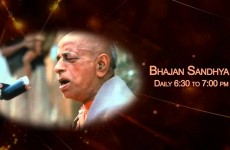Program from way back interview with famous punk group X Ray Spex singer Poly Styrene (Marianne Joan Elliott) who recently left her body after a battle with cancer at the age of 53. Poly Styrene was an initiated vaishnavi known with the name Maharani Dasi.
The death of Poly Styrene (aka Marianne Joan Elliott-Said) at 53 marks the end of a remarkable and unconventional life.
Born in 1957 in Bromley, Kent she was brought up in Brixton by her mother, a legal secretary of Scots-Irish descent. Her father was a dispossessed Somali aristocrat. She was always fascinated by this mixed background.
Entering the fashion world after school, she designed clothes and modelled before running away to “somewhere near Bath to live on water from streams and eat ferns”. Her idyllic hippy existence ended when she developed septicaemia and she moved back to London.
Pursuing a parallel career in music, she sang in jazz bands in Bath and cut her debut single, Silly Billy, a pop-reggae song, under the name of Mari Elliott. She continued demoing songs, writing with several big-name session musicians including guitarist Gary Moore, but it was seeing the Sex Pistols play Hastings Pier on July 3, 1976 (her 18th birthday) that introduced her to the possibilities inherent in punk. “There was only about thirty people there and the band could hardly play but I realised that I was making everything too complicated,” she said. With her manager Falcon Stuart Poly recruited a band with an ad for “young punx who want to stick it together” and named the group X-Ray Spex after her clothes stall on Chelsea’s Beaufort Market.
The band entered the frantic early punk scene of London in early 1977 with a residency of gigs at the Man In The Moon pub on the King’s Road, supported by Adam And The Ants and other young turks surfing in the wake of the Sex Pistols’ inspirational surge. Picking up a one-off record deal with Virgin, they released their debut single Oh Bondage Up Yours! in November 1978. The record had an instant impact – one review calling it the “last great punk rock single”. With its helter-skelter, sax-driven, Stooges-riffing backdrop it was the perfect vehicle for Poly’s singular voice and brilliant lyrics.
With a series of hit singles – including Identity, The Day The World Turned Day-Glo and Germ Free Adolescents – and an acclaimed debut album, the band looked set for the long haul. Poly was the perfect pop star for the times. She was smart and talented and exuded a confidence in her own individuality that was reflected in her self-designed clothes – mixing ’50s retro with bin-liners and fluoros – and reacting against the dull idea that women had to be pin-ups by wearing braces on her teeth.
Her breakdown in 1978, when she saw a flying saucer after a gig in Doncaster, saw her opt out of music and become a Hare Krishna. Eventually diagnosed as bipolar, she spent several years living in religious seclusion, occasionally returning to music for the occasional release. She would eventually move back to London and then to Hastings but Krishna Consciousness would always be important to her, and a source of great strength in the occasional difficult periods of her life.
There was a solo album, Translucence, in 1980 – a move away from X-Ray Spex’s new wave spazz to a quieter, jazzier sound. In 1986, she released the EP Gods & Godesses on the Awesome label. A New Age solo album, Flower Aeroplane, followed in 2004. In 2008 she put X-Ray Spex back together for a sold-out gig at the Roundhouse supported by her beloved daughter Celeste Bell-Dos Santos’s band, Debutant Disco. Around the same time she recorded a great vocal on my band Goldblade’s Christmas single, City Of Christmas Ghosts.
She was a joy to work with in the studio. We asked her to sing like she used to and at first she said that would be difficult, then walked into the vocal booth and did it in one take, adding an improvised Hare Krishna chant at the end that brought the song an unimagined power and beauty.
She was a wonderful, warm and beautifully eccentric woman in all the best possible ways, and all who knew her recall her lengthy phone conversations, ranging from spirituality to current affairs to music and beyond. She was one of the key performers of the punk period and her powerful songs -perceptive poems about plastic society and consumerism that cut through all the bullshit – still influence musicians three decades later (“Poly Styrene [was] so ahead of her time,” noted The Gossip’s Beth Ditto in tribute. “She recreated punk”). She was a brilliant, positive spirit in a cynical world. Hare Krishna, Poly, Rama Rama Hare Hare.

















































































